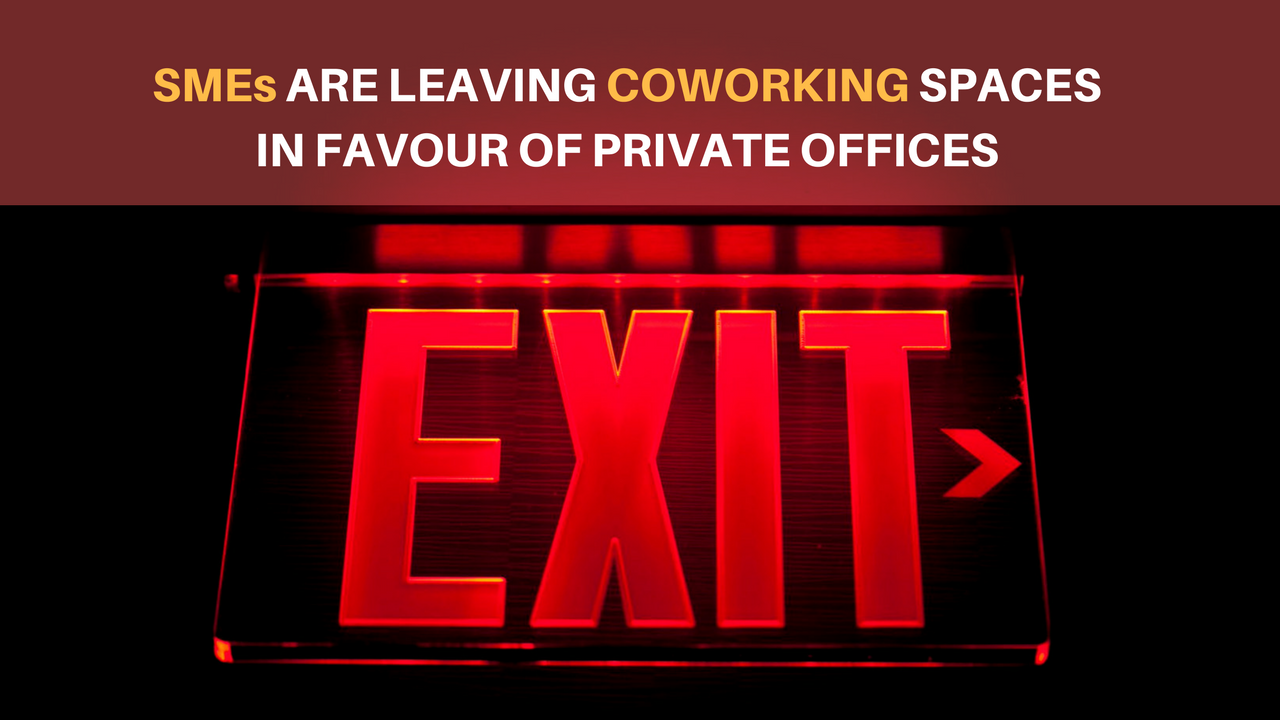- SMEs favour private offices to coworking spaces, according to new research
- Lack of space is only one deciding factor
- Both niche and mass-generic coworking spaces could still appeal to SMEs
SMEs are leaving coworking spaces in favour of private offices, according to UK flexible office space marketplace Hubble.
Hubble’s search data revealed searches for private office space grew on average by 40% month on month in 2017 by SMEs, with 62% of all searches made for private offices.
This represents an increase of 248% year-on-year in the number of searches for private offices being made by these larger SMEs with a 30+ headcount (out of a data pool of more than 90,000 searches).
And, while these private offices are often still available on flexible contracts, they are not the shared spaces you might expect companies to be moving into, according to Hubble. This may come as little surprise to some – open plan offices are not always the best environment for all businesses (and workers) to operate in.
Hubble itself moved out of a coworking space, as its head of PR and business development lead, Varun Bhanot explained: “Our decision to leave our coworking space was based on a number of factors, space being the first issue.
“We had reached a point of company maturity where our teams were big enough to need their own rooms. Having a private space meant we could effectively ‘section’ our teams, and enable each to operate as an individual entities with their own team leads and goals.
“We found this aided productivity and was a natural part of scaling up as a company.”
We chose a private office, but it still offered a flexible licence and lots of cool communal space. It offered the best of both worlds
The decision by SMEs to leave coworking spaces is also not only based around space, as Charlie Thuillier, founder of Oppo Ice Cream, said: “At Oppo Ice Cream, we have spent a huge amount of time investing in our culture and employee wellbeing. Coworking spaces are great but we wouldn’t want to risk diluting our culture as we scaled – it was not just about space.”
Oppo Ice Cream is now based in London’s The Food Exchange, which offers private studios, kitchen space and a food culture venue to the city’s gastro entrepreneurs and startups.
“Having a private office in The Food Exchange enables Oppo to build a unique space reflecting our brand, culture, attitudes, and beliefs as a company. You walk into our office and you know it’s Oppo’s [space]!
“It’s unlikely any incentive to stay in our previous space would have topped our motivations on this part.
“Oppo is now stocked in 6,000 stores across eight countries and has increased revenues 350% on last year. We needed an impressive ‘own-able’ space that could continue to facilitate this rapid growth.”
In fact, it seems persuading SMEs to stay put in a coworking space is no mean feat, as Bhanot added: “I’m not sure our original coworking space could have offered us a suitable incentive to stay. Our whole team was very motivated by the idea of working in a fresh environment. We chose a private office, but it still offered a flexible licence and lots of cool communal space where we found we could still connect with other companies. It offered the best of both worlds.”
Homogenisation – the Only Hope?
So, how can coworking spaces hang onto SMEs and buck this trend that Hubble has identified? Bhanot’s comment about offering ‘the best of both worlds’ could hit the nail on the head.
We are already seeing a crossover of design between classic serviced offices and coworking spaces. For example, WeWork’s business model focuses heavily on coworking – and yet they go after multi-user, multi-location clients (just like Regus). And Regus is slowly building its second brand Spaces, based on the coworking model.
From The Office Group to Orega, hybrids are popping up left, right and centre around the world. The nature of coworking is changing and, if spaces want to hold onto their burgeoning SMEs, they may need to offer more private office space within their walls.
One size no longer fits all. However, while Hubble is thriving in its private office with a coworking flavour, Oppo Ice Cream is clearly at home in its industry-specific space.
These are only two SME examples, but they do signal a wider move in the flexible workspace industry. We have reached a crossroads and coworking spaces have to make a decision: niche down to attract a small, target audience, or start designing your spaces with multiple areas and aesthetics to appeal to a multitude of businesses.



 Dr. Gleb Tsipursky – The Office Whisperer
Dr. Gleb Tsipursky – The Office Whisperer Nirit Cohen – WorkFutures
Nirit Cohen – WorkFutures Angela Howard – Culture Expert
Angela Howard – Culture Expert Drew Jones – Design & Innovation
Drew Jones – Design & Innovation Jonathan Price – CRE & Flex Expert
Jonathan Price – CRE & Flex Expert











